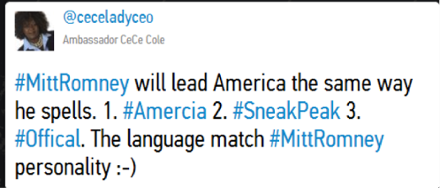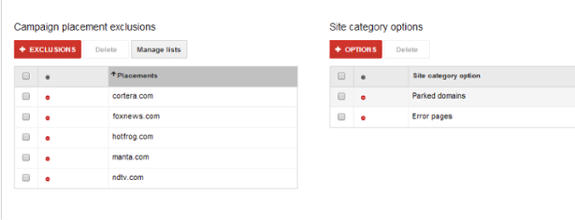[display-name-category]
[post_author]
Ads are the representatives of your company; they provide a message for the audience you wish to address.
Everything you build around a PPC campaign is done in order to ensure its success, not its failure.
That’s why it’s important to always double-check everything to make sure you have things down to a tee, this way you will avoid a huge flub that can make you the laughing stock of your competitors.
I will go through on 7 major PPC mistakes that will make any advertiser look incompetent and that can ultimately hurt a company’s image.
1. Grammatical Horrors
This is my number one of the entire list. Why? Well, only because credibility goes down the toilet when you see something misspelled. We immediately look for the culprit of such a heinous grammatical mistake that has made us laugh and pass judgment on them. This can spell disaster for any company when creating ad copy, and one little slip can be enough to make you seem unprofessional.
Presidential candidates are not exempt from spelling mistakes in their ads nor are they exempt from public scrutiny:

Just make sure this is neither you nor your ads. Always, ALWAYS, ALWAYS double check your ads before letting them go live.
2. Showing Up Where You Shouldn’t
Another mishap that makes you appear incompetent is the lack of proper negative keywords. Negative keywords are essential to all PPC campaigns. This is one of the first things that should be addressed when creating campaigns and optimizing them. However, for the sake of brevity, I won’t be going into more detail regarding the A-B-Cs of negative keywords.
It’s important to assess the right negative keywords to avoid showing where your ads have no place in. There can be nothing worse for a respectable Massage Clinic to show up for searchers that are looking for… well you can imagine what type of searches.
In order to avoid this, create a thorough and exhaustive negative keyword list that can eliminate all types of undesirable possibilities.
3. Not Setting Specific Goals for Your PPC Campaign
Is any campaign built just because? Do businesses just throw their money down a rabbit hole expecting fantastic results? There is always a goal to anything involving money.
Not establishing specific goals from the start is like telling a client to just hand over money to have a pretty ad show up when people search for their products/services.
Anyone who advertises has a goal in mind when they decide to create a PPC campaign, whether this is brand exposure or increase in revenue in x amount of time. These should always be addressed with an appropriate strategy in order to reach that goal.
Also, it’s important to keep in mind that even when a campaign is doing exceptionally by meeting and exceeding your goals, keeping the campaigns on autopilot should never be an option. There is always room for improvement.
4. “Saving Time” with Dynamic Keyword Insertion
Are you using DKI (Dynamic Keyword Insertion) for ad groups with different variations of keywords? This automated feature can easily get you in trouble if you don’t do things properly.
Be conscious of the fact that your headline is the first thing people read when they view an ad. This is why is especially important that it’s relevant to what people search. Having a poorly constructed ad group with random keywords that have no rhyme or reason to each other, and at the same time are using DKI can easily spell disaster.
Take for example one of our clients that owned a hair product line. He came to us with a DKI campaign. One of his ad groups, a volume tester, contained a salad of keywords.
There were random words such as shampoo, frizzy hair, split ends, and a competitor’s product name (which we will omit).
There was also an ad that had DKI, meaning his company’s ad was showing for all types of search terms, as well as a headline with random words that had very little to do with the description text as well as the landing page itself.
However, and most importantly, his ads had a DKI headline, which means he was showing the competitor’s name on his own ad! This could have landed him in a world of trouble.
5. Not Showing Ads All Day
The beauty of advertising online is the availability to show your ads to the audience of your choice at any time of the day. Not having these ads available is a big no-no, which is just a slew of missed opportunities for your company.
This is why it’s important to have a proper assessment of bids according to the budget and traffic that is generated by your campaign. More important after this, is making sure to monitor ad spend throughout the day to make sure you are showing at your most profitable times of the day and you are not completely absent.
6. Not Using Ad Extensions (This Will Actively Hurt You)
Ad Extensions are a wonderful thing. Anything that makes things look grander always helps in catching anyone’s attention. There is no reason to not use them. There is also a varied selection of extensions that are most useful according to your industry.
For example, local businesses like pizza shops will benefit greatly from Call and Location extensions in order to ensure that customers on the go contact and locate their business immediately to buy their pizza.
Furthermore, it’s important to point out Google’s announcement that they will now take into account Ad Extensions in its Quality Score algorithm. Therefore, ad extensions have to be relevant to the ads themselves in order to boost performance.
7. Display Ads on Irrelevant Sites
It’s important to avoid using manual placements to monitor your automatic placements if you decide to run ads on Display. You should carefully select your demographic and target according to your audience.
This will ensure that your ads are being shown to the right people in the right places. Retaking our client’s example, a hair product company really looks a bit off on sites that have to do with gross and bizarre content.
That’s why it’s important all the proper exclusions are made. You can make sure to have either or both, campaign Placement Exclusions or by Site Category, which provides a complete list of categories to consider excluding such as sensitive content, types of placements, video content/ratings, and ad location.

Adhere to the Best Practices and Avoid a World of Trouble
All in all, it’s important to double-check absolutely everything and make sure the best practices are met. These little mistakes can create a world of trouble for you and your company’s image.
Make sure you aren’t guilty of committing these big flubs, and you can be sure that everything is smooth sailing from thereon.
Share with us what common mistakes do you see advertisers often make? What’s the one mistake in this list that is detrimental to a company’s image?






